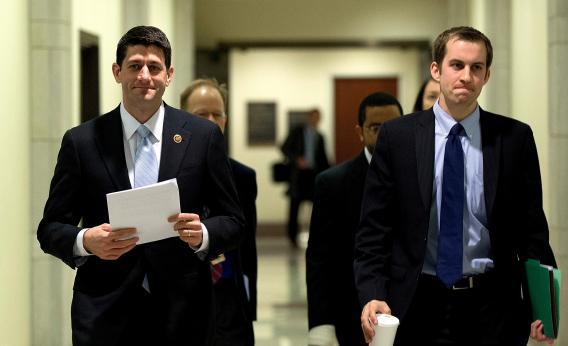The last 17 rounds of Paul Ryan’s budgets didn’t lead to a balanced budget within the 10-year scoring window because there’s no reason to balance the budget within the 10-year scoring window or, indeed, ever. But somehow, as part of the intracaucus politics around the fiscal cliff and the debt ceiling, John Boehner ended up telling backbench members that he was going to balance the budget within 10 years. So Ryan dutifully adjusted the magic asterixes in his tax reform “plan” and produced a balanced budget.
“This is an invitation. Show us how to balance the budget,” Mr. Ryan said. “If you don’t like the way we’re proposing to balance our budget, how do you propose to balance the budget?”
Ryan was, obviously, right the first time. There’s no need to balance the budget. In general, the economy grows from year to year. That’s especially true in nominal terms. So a continuous modest deficit is consistent with a scenario in which the burden of debt is always shrinking. You can see this most clearly in the post-World War II era. The U.S. borrowed enormous sums of money to fight the war, but by 1970 or so the debt-to-GDP ratio was extremely small. That’s not because we ran surpluses in the ‘50s or ‘60s; it’s because we ran small deficits and the Federal Reserve always acted quickly to prevent recessions from lingering to ensure a rapid return to full employment.
Something else to note is that politicians and journalists sometimes suffer from CBO blindness when talking about this kind of thing. Even if Congress passes a law that the CBO scores as leading to a $0 budget deficit in 2022, the odds of a $0 budget deficit arising in 2022 are extremely low. The 1999 budget surplus was not forecast in 1990, and the 2009 budget deficit was not forecast in 2000. Stuff happens. It’s good to aim for fiscal sustainability and it’s good to estimate fiscal needs over the medium term, but it’s dumb to get too hung up on precise target points and the number zero.
